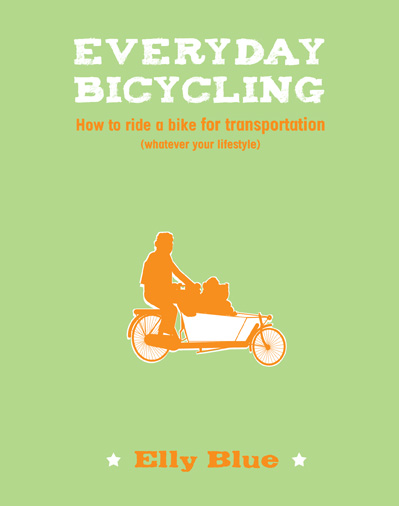Thursday, May 12, 2016
How to Be a Durable Human Being - May 18 Event
FABB members interested in a fresh take on the reasons why cycling enriches and strengthens their mind, body, and spirit should plan on attending a book launch party on Wednesday, May 18, at One More Page Books. At the event, FABB member and Northern Virginia community leader Jenifer Joy Madden will be discussing her new book How to Be a Durable Human: Revive and Thrive in the Digital Age through the Power of Self-Design.
In what is described as a handbook for being a human in the 21st century, readers learn to refresh in themselves what has been inadvertently trammeled by their close association with smart phones and other devices of personal technology. Jenifer describes how a cycling crash on the W&OD trail prompted her to think about distractions in her life and then develop simple ways to reduce time spent with gadgets and add more activity to each day to promote better health and sleep, especially for children. Among the stories in her book, Jenifer explores FABB President Jeff Anderson’s efforts to start a bike train for children biking to school and highlights the suburban multi-modal transportation advocacy of local cycling mover and shaker Finnouala Quinn.
Jenifer is a multi-media journalist, digital media professor, and parent of three who lives in the Tysons, Virginia, area, and – as an appointed county transportation commissioner – she literally and figuratively builds bridges to greater well-being.
Everyone is welcome. One More Page Books is easily accessible by bike and is just off the W&OD Trail at 2200 N Westmoreland Street near the East Falls Church Metro.
Labels: bike train, everyday bicycling, fionnuala quinn, health, jenifer madden
Sunday, November 25, 2012
New bike books
City Cycling and Everyday Bicycling: How to Ride a Bike for Transportation are new books that would make great holiday gifts. Everyday Bicycling is a great book for someone just starting to use a bicycle for transportation. Author Elly Blue "introduces you to the basics, including street smarts, bike shopping, dressing professionally, carrying everything from groceries to children to furniture, and riding in all weather. With its positive, practical approach, this book is perfect for anyone who has ever dreamed of riding a bicycle for transportation." Elly writes Taking the Lane, "Books and ideas for you and your bicycle."City Cycling documents the growth of cycling in cities around the world. Co-author John Pucher, a professor at Rutgers, has written extensively on what it takes to make bicycling a viable transportation option. The other co-author Ralph Beuhler is Assistant Professor, Urban Affairs & Planning at Virginia Tech's Alexandria Center. He recently wrote about bicycling in the DC area: Determinants of bicycle commuting in the Washington, DC region: The role of bicycle parking, cyclist showers, and free car parking at work.
City Cycling:
Bicycling in cities is booming, for many reasons: health and environmental benefits, time and cost savings, more and better bike lanes and paths, innovative bike sharing programs, and the sheer fun of riding. City Cycling offers a guide to this urban cycling renaissance, with the goal of promoting cycling as sustainable urban transportation available to everyone. It reports on cycling trends and policies in cities in North America, Europe, and Australia, and offers information on such topics as cycling safety, cycling infrastructure provisions including bikeways and bike parking, the wide range of bike designs and bike equipment, integration of cycling with public transportation, and promoting cycling for women and children.
City Cycling emphasizes that bicycling should not be limited to those who are highly trained, extremely fit, and daring enough to battle traffic on busy roads. The chapters describe ways to make city cycling feasible, convenient, and safe for commutes to work and school, shopping trips, visits, and other daily transportation needs. The book also offers detailed examinations and illustrations of cycling conditions in different urban environments: small cities (including Davis, California, and Delft, the Netherlands), large cities (including Sydney, Chicago, Toronto and Berlin), and “megacities” (London, New York, Paris, and Tokyo). These chapters offer a closer look at how cities both with and without historical cycling cultures have developed cycling programs over time. The book makes clear that successful promotion of city cycling depends on coordinating infrastructure, programs, and government policies.
City Cycling emphasizes that bicycling should not be limited to those who are highly trained, extremely fit, and daring enough to battle traffic on busy roads. The chapters describe ways to make city cycling feasible, convenient, and safe for commutes to work and school, shopping trips, visits, and other daily transportation needs. The book also offers detailed examinations and illustrations of cycling conditions in different urban environments: small cities (including Davis, California, and Delft, the Netherlands), large cities (including Sydney, Chicago, Toronto and Berlin), and “megacities” (London, New York, Paris, and Tokyo). These chapters offer a closer look at how cities both with and without historical cycling cultures have developed cycling programs over time. The book makes clear that successful promotion of city cycling depends on coordinating infrastructure, programs, and government policies.
Labels: city cycling, elly blue, everyday bicycling, john pucker, ralph buehler






